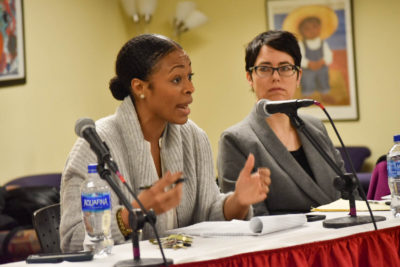
In light of the recent #MeToo movement that has blown up on social media surrounding the topic of sexual harassment, Boston University hosted a student-faculty forum Tuesday night titled “#MeToo #YouToo? What We Know About Sexual Harassment,” featuring a panel of experts on the implications of sexual harassment in today’s volatile society.
The forum began with a seven-minute talk by each of the four panelists on their area of expertise in relation to sexual harassment. These discourses were followed by a discussion portion, where attendees could voice their concerns and sentiments about sexual harassment, as well as ask the panelists questions.
Among the panelists was law professor Linda McClain, who said that although it is important to discuss sexual assault on college campuses, the issue is applicable in other places as well.
“Obviously there’s a longstanding concern over college campus sexual assault,” McClain said before the panel. “#MeToo, to my knowledge anyway, has been more focused on people coming forward talking about experiences they had in workplaces.”
In handouts she gave to the audience of around 50 people, McClain said the #MeToo movement, launched in 2006 by activist Tarana Burke, went viral in October 2017 when actress Alyssa Milano encouraged women to post the message “me too” on social media if they had ever experienced sexual assault or harassment. More than 1.7 million people responded, McClain said.
Jaimie Gradus, a professor of psychiatry in the School of Medicine and of epidemiology in the School of Public Health, was also a part of the expert panel. She said that over the years of her career and research, she has witnessed a shift in the perception of sexual violence toward being a public health problem, especially more recently.
“I think the #MeToo movement is well-timed to continue that momentum going and hopefully get more resources devoted to addressing sexual violence as a public health problem,” Gradus wrote in an email before the panel.
It is important to educate undergraduate students about this public health issue, Gradus wrote, especially those who have an interest in pursuing research or clinical work in this area of study.
In speaking about sexual harassment and assault in terms of intersectionality, panelist Saida Grundy, a professor of sociology and African-American studies, said the conversation cannot end with white, working-class women.
“If you do not want to address classism, you cannot address sexual harassment and sexual violence against working-class women,” Grundy said.
Rachel Chartier, a sophomore in the College of Arts and Sciences, said she attended the event because she found it relevant to her Women’s, Gender and Sexuality Studies minor.
“I thought that it was very informative and [the topic of sexual harassment] was approached from an intersectional framework, which was nice because I feel like sometimes that’s easily ignored, especially today,” Chartier said.
Students responded well to the panel, many offering advice about how to intervene as a bystander and asking questions about how to raise children to be more aware of sexual harassment.
The panelists also touched on sexual assault in the military, as panelist and BUSM professor of psychiatry Amy Street focuses her research on sexual trauma in the military.
Street is also a psychologist in the Women’s Health Sciences division of the National Center for PTSD in the VA Boston Healthcare System. As a clinical psychologist, she works directly with survivors of sexual trauma.
Street said the secrecy and cover-ups surrounding sexual harassment make it a hard issue to eradicate, but the #MeToo movement has allowed those who have experienced sexual harassment or assault not to feel isolated.
“When women understand that many of us have gone through these same experiences, they don’t feel so alone,” Street said before the panel. “I think that can really help the recovery process.”
CAS senior Madeleine Gerhart agreed with Street’s sentiment about the importance of talking about sexual violence.
“I think it’s so important because so many women deal with [sexual harassment], and men,” Gerhart said. “I think that a lot of the ways that we can prevent it is through talking about it and through education and beginning the conversation.”
Kerry Sadlier, a junior in the College of Communication, said she thinks education is integral to conversations about sexual assault, as the panelists discussed.
“We’re all going into the workforce hopefully soon,” Sadlier said, “so addressing that now and hopefully keeping that in mind, we can be active bystanders in our potential workplaces.”






















































































































